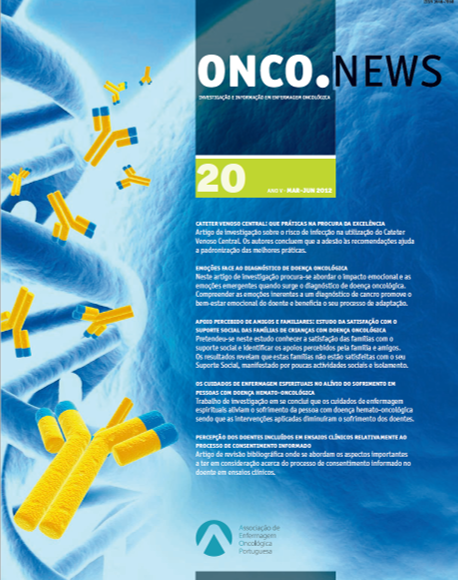Emotions facing the diagnosis of cancer disease
DOI:
https://doi.org/10.31877/on.2012.20.02Keywords:
cancer, emotions, fear, angerAbstract
This article seeks to address the emotional impact and the emerging emotions arise when the diagnosis of cancer. Given the impact resulting from the diagnosis of cancer are evident psychological consequences, at the level of emotional responses, emerging distress, severe anxiety, depression and emotions like fear and anger. Based on the concept of Lazarus emotion we have developed a descriptive study of qualitative research to determine the emotions unleashed against a diagnosis of cancer. The study results showed that, given the diagnosis of oncological diseases, arise the emotions of fear and anger. It should be emphasized that in spite of the emotions emerging being considered in the literature as negative, has a very important adaptive potential. Understanding the emotions inherent in a diagnosis of cancer, it seems supportive of skills that enhance the effectiveness of a therapeutic relationship which promotes the emotional well-being of the patient and facilitate the process of adaptation.
Downloads
References
Bardin, L. (2004). Análise de conteúdo (3 ed.). Lisboa: Edições 70.
Burgess, C., Cornelius, V., Love, S., Graham, J., Richards, M., & Ramirez, A. (2005). Depression and anxiety in women with early breast cancer: Five years observational cohort. (Vol. 330). (B. M. Journal, Ed.)
Cabral, J. M. (1993). O Desafio da Normalidade (Impressões do fim da vida). Lisboa: Rei dos Livros.
Damásio, A. (2003). Ao Encontro de Espinosa: as emoções sociais e a neurobiologia do sentir. Mem Martins: Publicações Europa-América.
Epping-Jordan, J., Compas, B., Osowiecki, D., Oppedisano, G., Gerhardt, C., Primo, K., et al. (1999). Psychological adjustment in breast cancer: process of emotional distress. Health Psychology , 18 (4), pp. 315-326.
Fawzy, F., Fawzy, N., Hyun, C., Elashoff, R., Guthrie, D., Fahey, J., et al. (1993). Maligmant melanoma. Archives of General Psychiatry , 50 (9), pp. 681-689.
Fernandes, S. (2009). preditores psicossociais do Ajuntamento à Doença e Tratamento em Mulheres com Cancro da Mama: O papel do Estado Emocional, das Representações de Doença, do Optimismo e dos Benefícios Percebidos. Portugal: Tese de doutoramento
apresentada na Universidade do Minho, Instituto de Educação e Psicologia.
Haynal, A., Pasini, W., & Archinard, M. (1998). Medicina psicossomática : perspectivas psicossociais. Lisboa: Climepsi Editores.
Izard, C. E. (1991). The Psychology of emotions. New York: Plenum Press.
Izard, C., & Ackerman, B. (2000). Motivational, organizational, and regulatory functions of discrete emotions. In M. In LEWIS, & M. HAviland-Jones, Handbook of emotions (2 ed.). London: The Guilford Press.
Knobf, M. T. (2007). Psychosocial responses in breast cancer survivors. Seminars in Oncology Nursing , 23 (1), pp. 71-73.
Lazarus, R. (1991). Emotion and adaptation. New York: Oxford University Press.
Ledoux, J. (2000). O Cérebro emocional: as misteriosas estruturas da vida emocional. Cascais: Pergaminho.
Martin, D., & Boeck, K. (2000). QE o que é a inteligência emocional: como conseguir que as nossas emoções determinem o nosso triunfo em todas as situações (2 ed.). Pergaminho: Cascais.
Martin, P. (2004). A Mente Doente: cérebro, comportamento, imunidade e doença. (2ª edição ed.). Lisboa: Bizâncio.
Matos, P., & Pereira, M. (2002). Áreas de intervenção na doença oncológica. . In M. Pereira, & C. Lopes, O doente oncológico e sua família. (pp. 15-25). Lisboa: Climepsi.
McCray, N. D. (2000). Questões psicossociais e da qualidade de vida. In S. E. Otto, Enfermagem em oncologia (3 ed.). Loures: Lusociência.
Oatley, K., & Jenkins, J. M. (2002). Compreender as emoções . Lisboa: Instituto Piaget.
Ogden, J. (1999). Psicologia da Saúde. Lisboa: Climepsi.
Phaneuf, M. (2002). Comunicação, entrevista, relação de ajuda e validação. . Loures: Lusociência.
Ribeiro, J. (2005). Introdução à Psicologia da Saúde. Coimbra: Quarteto.
Rodrigues, C. – Programações afectivas inatas. In Rodrigues, C.; Teixeira, J. ; Gomes, M. – Afectividade. Porto: Contraponto, 1989.
Santos, C. (2006). DOENÇA ONCOLÓGICA representação, coping e qualidade de vida (1 ed.). Coimbra: Formasau.
Seligman, L. (1996). Promoting a Fighting Spirit. San francisco: Jossey-Bass Publishers.
Selye, H. (1987). Qué es le síndrome general de adaptación. In S. Bensabat, & H. Selye, Stress: grandes especialistas responden (pp. 24-28). Bilbao: Mensagero.
Soares, M., Moura, M., Carvalho, M., & Baptista, A. (2000). Ajustamento emocional, afectividade e estratégias de coping na doença do foro oncológico. Psicologia, Saúde e Doenças , 1 (1), pp. 19-25.
Serra, A. (2007). O Stress na vida de todos os dias (3ª ed.). Coimbra: Adriano Vaz-Serra.
Weisman, A. D. (1989). A model for psychosocial phasing in cancer. In R. H. Moos, Coping with physical illness: new perspectives (pp. 107-122). New York: Plenun Medical Book Company.
Downloads
Published
How to Cite
Issue
Section
License
Copyright (c) 2023 Luis Miguel Ferreira, Célia Santos, Emília Bulcão

This work is licensed under a Creative Commons Attribution-NonCommercial-ShareAlike 4.0 International License.




